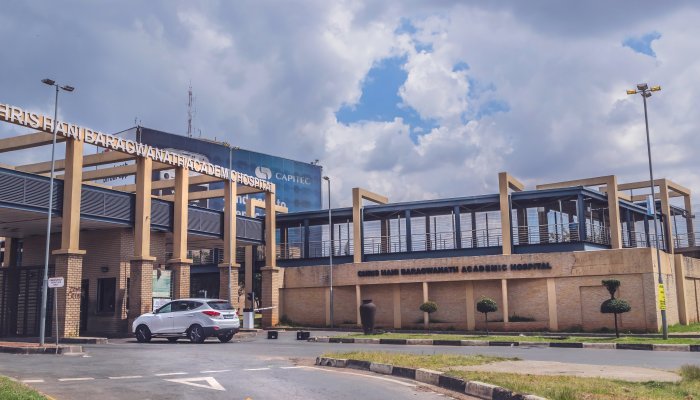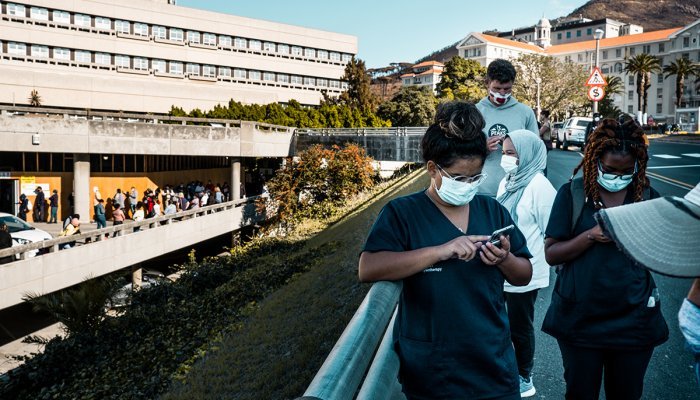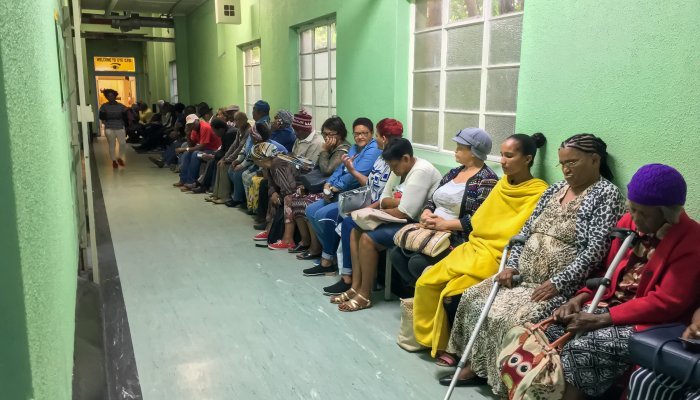In March 2020, life as we knew it came to an abrupt halt. A then-new and much-feared zoonotic virus, Covid-19, was hidden in plain sight and could be transmitted easily through the air and human touch. The pandemic has prompted many governments to use the gift of hindsight to regroup and learn from previous failings as they adapt and build response strategies for potential future outbreaks.
Dr. Evangelos Apostoleris, a nephrologist and GIBS MBA alumnus, hosted the conference held virtually over four consecutive afternoons. He asked Dr. Shabir Madhi, University of the Witwatersrand’s dean for the Faculty of Health Sciences and Professor of Vaccinology, to set the scene of the state of Covid-19 infection rates in the country.
Madhi noted that South Africa’s Covid-19 resurgence largely varied across the provinces during the third wave of infections. Providing a possible explanation for the rebound in infection rates in a province like KwaZulu-Natal that was previously on a downward trajectory, Dr Madhi said: “The type of gatherings that ensued in KwaZulu-Natal during the civil unrest is likely also [a] contributing [factor]. Compounding all of that are some concerning signs that there might be some other factors at play, whether it is a new variant that is emerging, sort of like a chimeric of the beta and delta variant, it’s still relatively early to say so, but I think we need to be on the lookout.”
Vaccine manufacturing for South Africa and beyond
Covid-19 brought the issue of health equity into the spotlight as the world watched wealthy countries bulk-order and hoard vaccines, while poorer countries were left cap in hand and begging them to donate any vaccines they could spare. South Africa, like many others, contributed to the Covax facility aimed at accelerating the development and manufacture of Covid-19 vaccines while guaranteeing fair and equitable access for every country. However, its vaccine rollout programme still lagged behind developed countries like the United Kingdom and America.
In October 2020, the governments of India and South Africa, with the support of 62 WTO member states, proposed a Trade-Related Aspects of Intellectual Property Rights (TRIPS) agreement waiver that would temporarily waive intellectual property rights protections for technologies needed to prevent, contain, or treat Covid-19, including vaccines and vaccine-related technologies.
Partner at Spoor & Fisher, Professor John McKnight, said South Africa is yet to implement all flexibilities available through the Doha declaration under the TRIPS agreement: “The Doha declaration, [allows] us to go a little bit further and in particular, to say that in times of crisis and expedient times – and we get to define what those are – we can dispense with the agreement.”
This TRIPS waiver offered South Africa’s Biovac Institute and generics leader, Aspen Pharmacare, the opportunity to step up and assist South Africa in bridging the gap towards vaccine equity by partnering with various stakeholders in the manufacturing of mRNA Covid-19 vaccines.
South African Health Products Regulatory Authority (SAHPRA) CEO, Dr. Boitumelo Semete-Makokotlela, said the Pfizer and Johnson & Johnson Covid-19 vaccines the South African government recommended under its vaccination rollout programme went through rigorous tests.
“With every vaccine that [we] authorise, we have to look at both the lab data as well as the clinical data regarding the frequency against the variance of concern. But also, the important consideration is around any continuous data […], but we need them to meet the minimum that's required for us to be able to authorise them in the country,” she said.
SAHPRA recently released a report that disputed claims that some people in South Africa had died of adverse events following vaccination.
Biovac Institute CEO, Dr. Morena Makhoana, said the partnership with global pharmaceutical giant, Pfizer, enabled them to take part in technology transfer and gain experience in manufacturing vaccines, which left them better equipped and ready to compete at a global level in the mass production of covid-19 vaccines.
“We’re the first mRNA technology transfer partner […] to be announced in the southern hemisphere. Even Australia does not have any mRNA. So, I think it also talks about the capability that we have,” said Makhoana.
Group chief executive for Aspen Pharmacare, Stephen Saad, said they created a portfolio that ensured they had the capacity to meet Johnson & Johnson’s vaccine manufacturing requirements using local talent based at their plant in Gqeberha (formerly Port Elizabeth).
“Bear in mind that [Johnson & Johnson] has got funding out of America and Europe, so that’s where they went first, but their number one supplier and the best supplier is Aspen,” Saad exclaimed.
He continued that the Johnson & Johnson regulatory level surpassed the United States Food and Drug Administration levels: “So we can meet the strictest regulatory requirements. That's a real plus for Africa, a real plus for Aspen, and I'm hoping that many others achieve that.”
Saad said they are looking forward to Aspen being Africa’s ‘serum institute’ someday. The Serum Institute of India is a large manufacturer of vaccines and immuno-biologicals.
Is the NHI possible?
The government introduced South Africa’s national health insurance (NHI) to reduce the cost of healthcare and standardise the quality of healthcare for both the rich and poor. In addition, it will ensure that there is no fee-for-service at the point of care, meaning those who are ill and need access to healthcare services will not be forced to pay for services before receiving medical assistance.
Dr. Imtiaz Sooliman, the founder of the not-for-profit organisation, Gift of the Givers, said the state of government hospital infrastructure was shocking and demonstrated the disconnect between the national government and provincial departments.
“There is a willingness for the private and public sector to work together. But what was frightening is, as we went to the hospitals, you saw the quality of the infrastructure. Are we going to run an NHI and bring in a private partnership on hospitals that are totally falling apart?
You can't bring that to the table. You have to fix your own system first before you bring partners in,” said Sooliman.
At present, South Africa spends 8.5% of its annual GDP on healthcare. The nine provincial health departments run independently of the national Department of Health, each making its own decisions. The provincial health budget is allocated from the overall provincial budget.
The NHI seeks to solve this through the NHI Fund, a pool of healthcare funding from general taxes, contributions of persons earning above a certain threshold, and monthly contributions made by employees to the fund.
Deputy director-general for the NHI under the Department of Health (DoH), Dr Nicholas Crisp, agreed that the government has challenges with its infrastructure, especially with the health departments’ infrastructure budget being managed by the department of public works.
“I've had lots of discussions about how we might use the private hospitals and infrastructure more constructively in a shared market and shared environment. It's true; we need to get the public sector to function differently and improve its quality. However, how you do it and what happens over time requires a framework and enabling legislation. And that's what is being debated in parliament at the moment – that enabling framework,” said Crisp.
Apostoleris asked Eric Buch, professor of health policy and management in the school of health systems and public health at the University of Pretoria, about the healthcare funding models South Africa should implement to obtain the best value for investment. Buch responded that the choice was between the current fee-for-service model, used by the country’s private healthcare sector, and capitation.
“There's pretty good evidence globally that fee-for-service models are not the best way to get good value for the money being invested in the care. There's a lot of talk about using capitation in the NHI at the primary health care level. And the [point] is capitation is fine, as long as you link it to some level of performance and outcome,” he said.
Migration towards telemedicine and digital health
The Covid-19 pandemic saw an emerging global trend in the migration towards digital health and telemedicine. When it became evident that Covid-19 posed a risk of infection among the population, face-to-face consultations between patients and their healthcare providers were mainly replaced with telemedicine.
Netcare’s health informatics officer, Chris Mathew, said the group was excited by a change in South Africa’s legislation around telemedicine. So, as a group, they introduced a product that would offer that solution to patients. But the uptake was not as they had anticipated.
“We didn't see the uptake we wanted. People still want to see their doctor and book that appointment and have that face-to-face interaction, whereas with telemedicine, it’s a different type of interaction,” he explained.
Mathew says South Africa can learn from how the Rwandan healthcare system leverages the use of technology through telemedicine. In Rwanda, community healthcare workers within community health clinics enable health delivery equity to the most vulnerable communities in low resource settings through telemedicine.
Mathew believes there is still a place for telemedicine in South Africa, and it should not be viewed as inaccessible. “Maybe it isn't how we envisioned it in kind of a video call with your doctor […] but a phone call to the patient, that's still telemedicine, and it can still achieve a lot of value as well,” said Mathew.
South Africa has seen rapid progressions towards digital health over the last decade, mostly in the private healthcare sector.
Discovery Health CEO, Dr. Ryan Noach, said that the organisation introduced a centralised medical record nine years ago, which improved the quality of care and provided medical professionals with a full picture and understanding of members administered under their healthcare scheme.
In early 2020, six of South Africa’s largest medical insurance administrators and private hospital groups announced that they had formed CareConnect. This national health data exchange platform openly shares and enables unified access to vital patient information among healthcare providers within the network.
The Department of Health seems inclined to migrate towards a digital system, which is seen in the Covid-19 vaccination rollout’s Electronic Vaccination Data System (EVDS), which Mathew said is almost the start of a government health information exchange where data is collated and stored in a centralised database.
Referring to the potential public-private partnership between the private healthcare sector and government, Noach said: “We certainly would make that data openly available to anybody in the Department of Health that needs it with the right credentials and security and consent, to create a central medical record for patients and drive up the quality of care.”
In hindsight, the past year has provided a steep learning curve for South Africa’s healthcare industry. Only time will tell whether the country has applied learnings from data collated from the initial Covid-19 infection waves.
Patient data and the POPI Act
Digital health migration brought innovation in the delivery of health solutions; however, it does lend itself to some concern around ownership of digital patient records and potential privacy infringements.
According to Elsabe Klinck, managing director at Elsabe Klinck & Associates, digital health data belongs to the patients. Still, part of the data remains the doctor or healthcare professionals’ intellectual property since it is their intellectual property output. Therefore, that information must be kept confidential to comply with South Africa’s Protection of Personal Information (POPI) Act.
“The other aspect that people miss is if that [digital health] information is stored somewhere else by somebody else, and they troll that data or do so-called ‘data scraping’. That would be a violation of the POPI Act because it is further processing and use that the person hasn't consented to,” said Klinck.
A question was raised on whether the private sector’s attempt at creating a health information exchange could lead to data being shared with insurers and changing the underwriting process even if the consumer owned the data.
Mathew responded that the National Health Act gives clear guidance that patients must give consent to use their data. However, he added that the POPI Act required the purpose of use and right of permission to be put in place before use: “Just because you've got consent doesn't mean it’s free for all. You can’t just do what you want, and that is extremely important.”
Klinck agreed that while patients must give their informed consent, a legal framework holds companies to account.
Highlighting the prohibitions set under the POPI Act, she said: “The main point for me is a very specific consent [is required] – no blanket consent. And be aware of an automated type of processing that could be to the detriment of an individual.”







